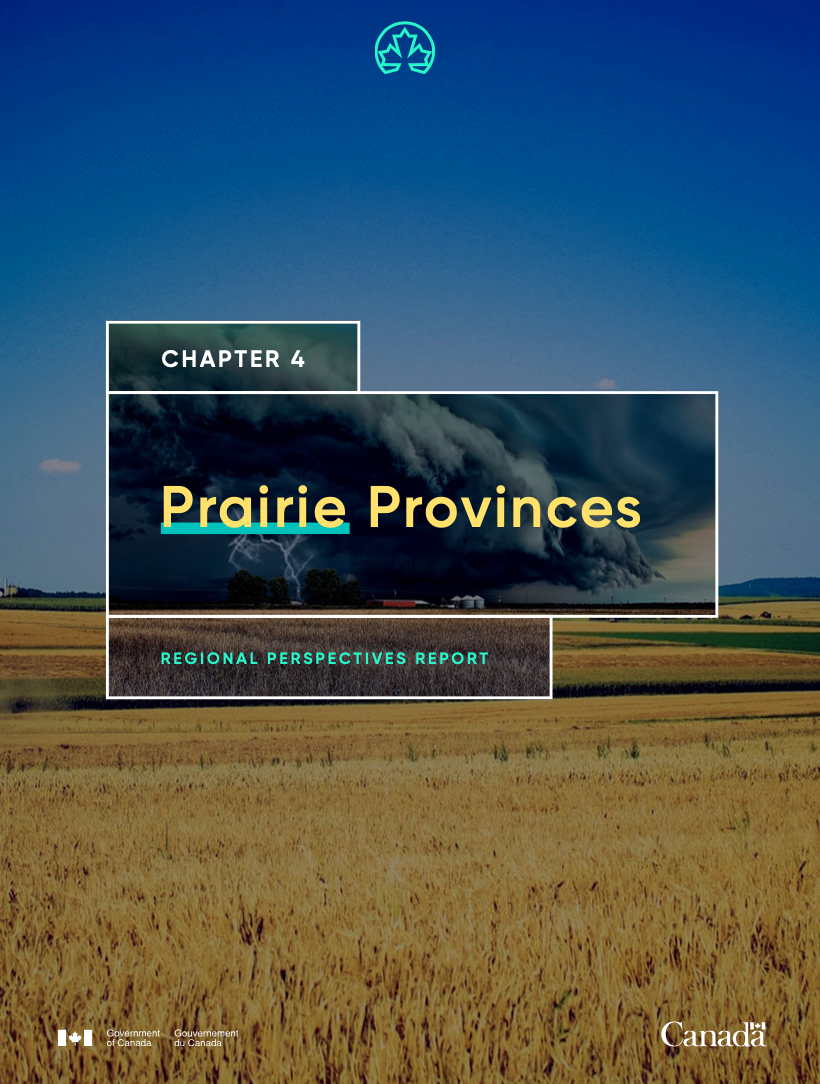Article /
Canada in a Changing Climate Regional Perspectives Report: Prairie Provinces

Key Messages
This resource was submitted by the Climate Risk Institute for theCanAdapt Climate Change Adaptation Community of Practice.
This article is an abridged version of the original text, which can be downloaded from the right-hand column. Please access the original text for more detail, research purposes, full references, or to quote text.
Prairie ecosystems will shift and transform as the climate warms (seeSection 4.2)
As species respond to climate change, large regions of boreal forest could transition to aspen parkland and grassland ecosystems, while entire mountain ecosystems could disappear. Although biodiversity could increase overall, some species will be lost if the rate of warming exceeds their ability to adapt. Adaptation interventions are based mainly on standard conservation strategies—such as reduction of anthropogenic and other stressors and disturbances—and minimizing barriers to movement.
Floods, drought and wildfires are getting worse (seeSection 4.3)
Extreme weather events of amplified severity will likely be the most challenging consequence of climate change in the Prairie Provinces. The impacts of flooding, drought and wildfire in recent years are unprecedented, and climate models suggest an increased risk of these events in the future. Provincial and municipal governments have responded by proposing policies, structures and practices to reduce the impacts of future extreme weather events.
Collaborative water management reduces negative impacts (seeSection 4.4)
Regional land-use policy and planning, as well as emergency preparedness, are critical for reducing the impacts of flooding and drought in the Prairie provinces. Collaboration is needed among all levels of government, and with stakeholders such as watershed stewardship groups, rural municipalities and conservation districts, to implement these adaptation measures and to promote practices that prevent or minimize adverse effects of water excesses and shortages.
Climate change brings both benefits and threats to agriculture (seeSection 4.5)
Prairie agriculture, particularly crop production, may benefit from higher temperatures and a longer growing season. Achieving net benefits will require adaptation to limit the impacts of climate extremes, including on water availability, and the increased risk of pests, vector-borne diseases and invasive species. Although agricultural producers are highly adaptable to fluctuations in weather and climate, barriers to adaptation include limited information and awareness of climate change impacts, combined with limited financial resources and institutional support.
Social groups have unique vulnerabilities and strengths (seeSection 4.6)
The impacts of climate change may exacerbate existing societal inequities, especially among Indigenous peoples, women, people of low socio-economic status, youth and the elderly. Public policy and adaptation planning should consider the unique vulnerabilities and strengths of these social groups, and also the means by which race, age, gender and poverty amplify vulnerability or resilience to climate hazards.
Adaptation planning helps to reduce climate risks (seeSection 4.7)
Cities are at the forefront of adaptation and resilience planning in the Prairie provinces. Governments and businesses have begun to assess climate risks and develop adaptation strategies, but few sector-specific plans and policies consider future climate risks, leaving some firms, governments and sectors unprepared. Assessing the effectiveness of adaptation measures and meaningful reporting would help achieve climate- resilient communities and local economies.
